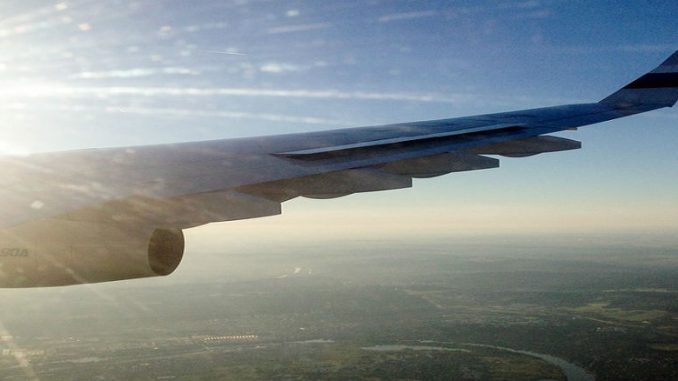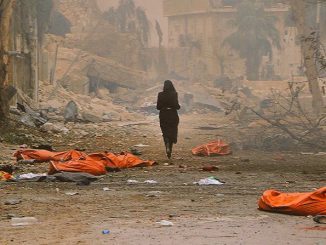
On the air with Rossiya 24 TV Channel, Russia’s Minister of Transport Maxim Sokolov has said that the Russian aviation experts did not make definite conclusions regarding quick resumption of air traffic with Egypt.
The minister said, “A team of specialists and experts arrived from Cairo has not yet reached a firm conclusion that we will be ready to resume the air traffic to Cairo in near future.”
Sokolov added, Egyptian authorities need to focus on working with the staff in national airports.
He said, “The most important point our Egyptian colleagues need to focus on now is work with the staff supervising the aviation security and monitoring access to the air side and to the airport on the whole.”
There is no doubt that Sokolov’s comments have caused a great disappointment to the Egyptian regime.
Russia started its inspection over Cairo airports after a Russian Metro jet flight crashed in Sinai Peninsula shortly after taking off from Sharm El-Sheikh International Airport on 31 October 2015, resulting in the death of all 224 passengers and crew on board.
Sinai Province, an affiliated group to the Islamic State (ISIS), claimed responsibility for downing the Russian flight.
As a result, Russia suspended passenger flights to Egypt shortly after the crash.
Moreover, a number of European countries suspended flights to Sharm El-Sheikh following the 2015 crash.
According to many observers there are four main reasons behind the Russian decision not to resume the tourist flights back to Cairo in the near future, the most important of all is to blackmail al-Sisi to sign more arm deals with Russia, Daesh new threats and the discovery of anti-craft missile near Cairo airport.
First: Anti-aircraft missile launcher allegedly found next to Cairo International Airport
A shoulder-fired anti-aircraft missile launcher lying in a heap of rubbish next to Cairo’s main international airport was allegedly found by an Egyptian man, according to The Telegraph(British newspaper).
Ibrahim Yousry, an Egyptian, said that he found an SA-7 missile launcher on the side of the road around a mile north of Cairo International Airport as he was heading to work.
In fact, the weapon has a maximum range of around 2.5 miles and so it could be used at that distance to strike a plane as it landed or took off.
Mr. Yousry wrote on his Facebook account, “The airport is not far away and it could cause disasters if it was placed here for a reason,” he added, “The airplanes here are an easy target because they fly at very low altitude and this is the best position for this weapon to be used.”
The weapon did not appear to be loaded with a missile, according to Mr. Yousry.
In this context, the executive director of Conflict Armament Research (CAR), James Bevan examined photographs of the launcher at the request of The Telegraph.
It was impossible to tell if the weapon was real based on a social media photograph but that it looked like an SA-7, a common portable anti-aircraft weapon, according to Mr. Bevan.
SA-7 version is manufactured in Egypt and many such weapons flooded out of neighboring Libya after the fall of the Qaddafi regime in 2011.
The Telegraph added, “It is impossible to know how the weapon ended up near the airport but the worst fear of Egyptian and Western intelligence is that it was planted by ISIS Egyptian affiliate, (Sinai Province) Wilayat Sinai, to be used in an attack on an aircraft.”
The Second Reason: Daesh Threats
Daesh threats might be the second reason behind Russia’s decision not to resume flights between Moscow and Cairo. ISIS new video which was released days ago, the militant group threatened Egypt’s Christian population and described them as the “favorite prey” of jihadists.
In the newly released video, ISIS showed the suicide bomber who killed nearly 30 people when he attacked a church in Cairo in December and the jihadist group promised more attacks against the country’s Christian minority.
A narrator describes Christians as ISIS’s “favorite prey” and says they do not enjoy the status of “dhimmis”, non-Muslims who were traditionally protected inside medieval Islamic empires.”
Instead, Christians are described as “infidels”. One of the jihadists featured in the video, “God gave orders to kill every infidel.”
In addition, Russia would fear targeting the touristic sites in Sinai in the light of the recent rocket attacks on the occupied territories in Palestine as “Eilat”. For the second time in a month, two rockets were fired in Egypt’s northern Sinai and have landed in southern Israel.
The rockets fell on the Eshkol region, which borders southern Gaza and the northeastern tip of the Sinai Peninsula.
On February 9, several rockets were fired at Israel’s port town of Eilat from Egypt’s Sinai Peninsula, with the Iron Dome interception system shooting down three while a fourth landed in an open area, according to the Israeli army.
The Islamic State (ISIS) has also claimed responsibility for firing multiple rockets on Eilat from Sinai. However, there were no reports of any casualties.
The Third Reason: Blackmailing Egypt’s Military Ruler
Observers believe that the third reason behind the Russian delay to resume the flights that Moscow is practicing a wide blackmailing process against Abdel Fattah al-Sisi and his government,who struggle to gain foreign legitimacy after they failed domestically as a result of the wrecked economic conditions in the country, especially in the touristic sector that struggles in an unprecedented way.
Despite Russia’s decisive decision to suspend the passenger flights to Egypt after the the Russian Metrojet crash last October 2015, however, Moscow started using this card to put pressure on the al-Sisi’s military regime to gain more benefits.
Russia’s pressures have reached the blackmailing level, especially after information spread saying that Moscow imposed on Cairo to purchase Russian security devices from specified companies in Russia as a condition to return back the Russian tourism.
The Fourth Reason: Blackmailing the regime to Purchase Arm Deals with Russia
On the other side,some observers believe that Russians is blackmailing al-Sisi to sign more arm deals and to start the Dabaa Nuclear Power Plant that is based on a huge loan from Russia that would reach $25 Billion.
In this way, Egypt will remain for many decades under the Russian mandate because of the expensive cost of these debts and the Russian administration to the nuclear station.
In addition, Sputnik reported that Egypt will receive some 50 MiG-29 fighters from Russia as scheduled in 2020.
The contract, was reportedly initiated after Russian President Vladimir Putin’s meeting with Abdel Fattah al-Sisi in February 2014,” which would be the largest order for the MiG-29 jets in the post-Soviet period.”
The contract on the delivery of some 50 MiG-29 Fulcrum multirole fighters reportedly sets the 2020 completion deadline.
In May 2015, Russia’s Vedomosti newspaper reported that the jets were going to Egypt as part of a US$3.5 billion arms deal signed by Putin and Sisi in April 2015.



